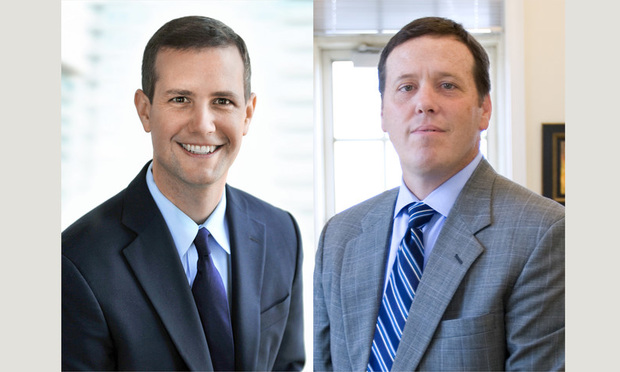Doctors Get Defense Verdict Over Claims of Failure to Diagnose Rare Spine Inflammation
Defense lawyers said that, even if the defendant doctors had diagnosed the neurological disorder earlier, there is no effective treatment.
December 02, 2019 at 01:08 PM
6 minute read
 David Mackenzie (left) and Daniel J. Huff of Huff Powell & Bailey. (Courtesy photos)
David Mackenzie (left) and Daniel J. Huff of Huff Powell & Bailey. (Courtesy photos)
A federal jury found no liability on the part of two doctors accused of failing to properly treat a man partly paralyzed by a rare and difficult to treat neurological disorder.
Defense attorneys said there was no dispute that the plaintiff, Daniel Shaw, was grievously injured as a result of the neurosarcoidosis that left him unable to walk more than a few steps and then only with the aid of a walker or four-legged cane.
"This is a disease that affects something like 5 in 5 million people," said David Mackenzie, who represented one of the defendants. "It's very rare, and our expert testified that there's no real treatment."
"We felt very confident that our client met the standard of care," said Mackenzie, who represented the family practitioner along with Huff, Powell & Bailey partner Dan Huff.
A key issue at trial was the defendants' failure to prescribe steroids to their patient, but fellow defense attorney Paul Weathington said that, even if such treatment were ordered early on, Shaw would not have benefited.
"There's just not any great science showing that steroids, no matter when you give them, are particularly effective for neurosarcoidosis," said Weathington, who tried the case with Weathington McGrew colleague Paul Reynolds.
The lawyers said the plaintiffs asked for $30 million in closing arguments.
Shaw is represented Wilson Law principal James Wilson Jr. and attorney and neurosurgeon Lawrence Schlacter. They did not respond to requests for comment.
Shaw's wife, Kimberley, is represented by Schneider Law principal Bethany Schneider, who said she joined the plaintiffs' team two weeks before trial.
"When I met the Shaws, I was struck by their perseverance and resilience in the face of such tragic, life-altering circumstances," said Schneider via email.
"We all knew that this would be an extremely challenging case, as we were dealing with a claim for delayed diagnosis resulting in paralysis involving a very rare condition. We were pleased with how the evidence came in with the jury and are obviously disappointed in the outcome," Schneider said.
The defense lawyers "tried a good case and were kind and decent to the Shaws," said Schneider. "We are currently evaluating our options.
According to the defense lawyers and court filings, the case began in 2013 a few months after Shaw, now 48, was involved in what Mackenzie termed a "very serious" car wreck.
Shaw went to see his primary care doctor, David Boaz, complaining of pain in his chest and leg.
Boaz prescribed medication, but Shaw's pain worsened, and he went to see orthopedic spine specialist Ali Mortazavi, complaining of low back pain that was radiating into his extremities nearly a month later.
Mortazavi scheduled an MRI, but before it happened, Shaw returned to Boaz with symptoms including numbness, pain and difficulty urinating.
Boaz ordered an expedited MRI, but the results came back negative.
"Our doctor called him and told him to follow up with the orthopedist immediately, but Mr. Shaw didn't do that," Mackenzie said.
Nine days later, Shaw went to see Mortazavi, by which time he was unable to walk.
Shaw had severe inflammation of the thoracic spinal cord, which was lower down than the area initially imaged by the MRI based on his symptoms at the time, McKenzie said.
Shaw was initially diagnosed with transverse myelitis, an inflammation of the spinal cord, but was ultimately judged to have contracted neurosarcoidosis.
Daniel and Kimberley Shaw sued Boaz and his practice, South Forsyth Family Pediatrics, and Mortazavi and his practice, Resurgens P.C., in Cobb County before dismissing and refiling the suit in the U.S. District Court for the Northern District of Georgia.
According to his filings, Shaw claimed the doctors' failure to timely prescribe high-dose steroids caused permanent nerve damage in his spinal cord.
Mackenzie said there were no substantive settlement discussions or mediation in the case.
As trial was approaching, the defense sought to have the judge impose sanctions, including potentially dismissing the case, over revelations that a plaintiffs causation expert, Dr. Michael Levy, treated Shaw in 2017, which was not disclosed.
Judge Billy Ray declined to strike the complaint but did order sanctions limiting Levy's testimony and imposed fines of $1,000 apiece on Wilson and Schlacter.
During a trial that trial began Nov. 18, Mackenzie said the defendants presented "a total joint defense; there was no finger-pointing at all. We shared causation experts and stayed out of each other's way."
He said key defense experts included Pittsburgh, Pennsylvania, neurologist Thomas Scott and internist Brent Savelli from Tifton.
At closing, the plaintiffs lawyers asked the jury to award $30 million, including $20 million for Shaw and $10 million for his wife's loss of consortium claim.
The jury took about two hours to find for the defense on Nov. 25.
The defense lawyers said they did not speak afterward to the jurors, who were "eager to get started on their Thanksgiving holiday."
"It was a well-tried case by both sides," Mackenzie said. "James and Bethany did a nice job representing their clients, they should be proud of what they did."
This content has been archived. It is available through our partners, LexisNexis® and Bloomberg Law.
To view this content, please continue to their sites.
Not a Lexis Subscriber?
Subscribe Now
Not a Bloomberg Law Subscriber?
Subscribe Now
NOT FOR REPRINT
© 2025 ALM Global, LLC, All Rights Reserved. Request academic re-use from www.copyright.com. All other uses, submit a request to [email protected]. For more information visit Asset & Logo Licensing.
You Might Like
View All

Upcoming Changes to Medicare Secondary Payer Reporting: What WC Insurers and Attorneys Need to Know
5 minute read
Biden Administration Tells Justices That Bans on Gender Care Are Sex Discrimination

11th Circuit Allows Florida Transgender Health Care Ban to Continue Pending Full Appeal on Constitutionality of Law
Trending Stories
Who Got The Work
J. Brugh Lower of Gibbons has entered an appearance for industrial equipment supplier Devco Corporation in a pending trademark infringement lawsuit. The suit, accusing the defendant of selling knock-off Graco products, was filed Dec. 18 in New Jersey District Court by Rivkin Radler on behalf of Graco Inc. and Graco Minnesota. The case, assigned to U.S. District Judge Zahid N. Quraishi, is 3:24-cv-11294, Graco Inc. et al v. Devco Corporation.
Who Got The Work
Rebecca Maller-Stein and Kent A. Yalowitz of Arnold & Porter Kaye Scholer have entered their appearances for Hanaco Venture Capital and its executives, Lior Prosor and David Frankel, in a pending securities lawsuit. The action, filed on Dec. 24 in New York Southern District Court by Zell, Aron & Co. on behalf of Goldeneye Advisors, accuses the defendants of negligently and fraudulently managing the plaintiff's $1 million investment. The case, assigned to U.S. District Judge Vernon S. Broderick, is 1:24-cv-09918, Goldeneye Advisors, LLC v. Hanaco Venture Capital, Ltd. et al.
Who Got The Work
Attorneys from A&O Shearman has stepped in as defense counsel for Toronto-Dominion Bank and other defendants in a pending securities class action. The suit, filed Dec. 11 in New York Southern District Court by Bleichmar Fonti & Auld, accuses the defendants of concealing the bank's 'pervasive' deficiencies in regards to its compliance with the Bank Secrecy Act and the quality of its anti-money laundering controls. The case, assigned to U.S. District Judge Arun Subramanian, is 1:24-cv-09445, Gonzalez v. The Toronto-Dominion Bank et al.
Who Got The Work
Crown Castle International, a Pennsylvania company providing shared communications infrastructure, has turned to Luke D. Wolf of Gordon Rees Scully Mansukhani to fend off a pending breach-of-contract lawsuit. The court action, filed Nov. 25 in Michigan Eastern District Court by Hooper Hathaway PC on behalf of The Town Residences LLC, accuses Crown Castle of failing to transfer approximately $30,000 in utility payments from T-Mobile in breach of a roof-top lease and assignment agreement. The case, assigned to U.S. District Judge Susan K. Declercq, is 2:24-cv-13131, The Town Residences LLC v. T-Mobile US, Inc. et al.
Who Got The Work
Wilfred P. Coronato and Daniel M. Schwartz of McCarter & English have stepped in as defense counsel to Electrolux Home Products Inc. in a pending product liability lawsuit. The court action, filed Nov. 26 in New York Eastern District Court by Poulos Lopiccolo PC and Nagel Rice LLP on behalf of David Stern, alleges that the defendant's refrigerators’ drawers and shelving repeatedly break and fall apart within months after purchase. The case, assigned to U.S. District Judge Joan M. Azrack, is 2:24-cv-08204, Stern v. Electrolux Home Products, Inc.
Featured Firms
Law Offices of Gary Martin Hays & Associates, P.C.
(470) 294-1674
Law Offices of Mark E. Salomone
(857) 444-6468
Smith & Hassler
(713) 739-1250






